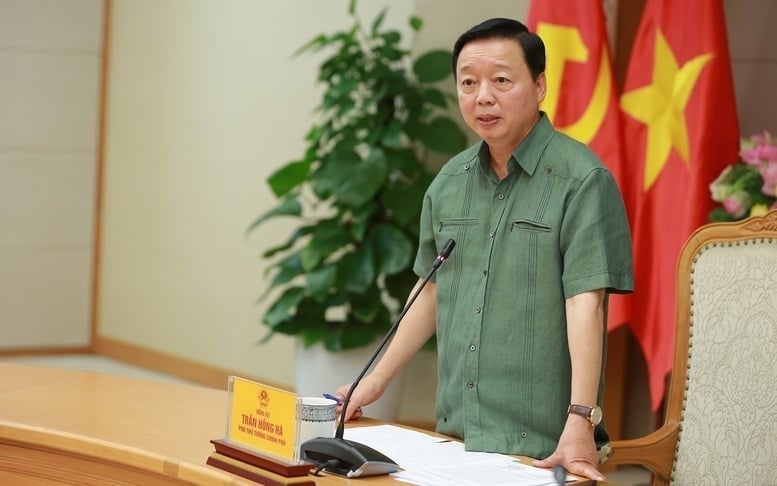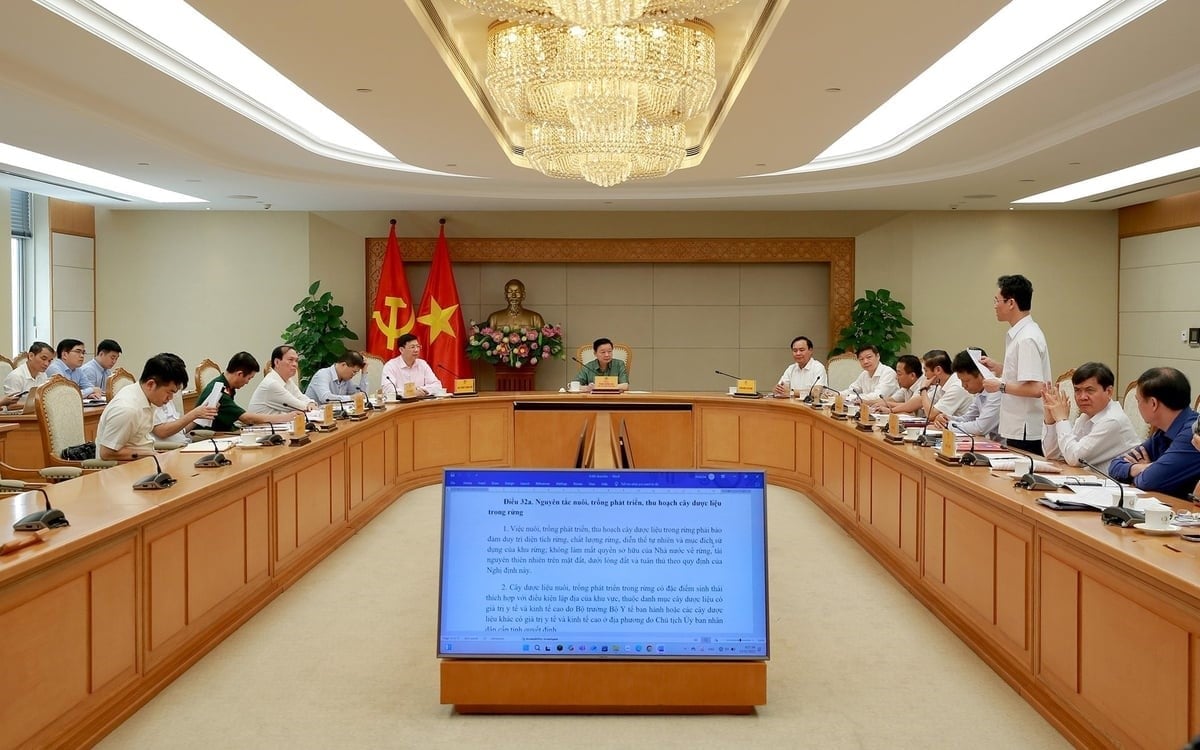December 8, 2025 | 09:56 GMT +7
December 8, 2025 | 09:56 GMT +7
Hotline: 0913.378.918
December 8, 2025 | 09:56 GMT +7
Hotline: 0913.378.918
On the morning of May 13, Deputy Prime Minister Tran Hong Ha chaired a meeting to review the draft Decree amending the Government’s Decree No. 156/2018/ND-CP, with additional provisions detailing the farming, development, and harvesting of medicinal herbs within forest areas. The meeting was attended by leaders from the Ministry of Agriculture and Environment (MAE) and the Ministry of Finance, as well as representatives from provinces with great medicinal herb potential, such as Nghe An, Quang Nam, Kon Tum, Lai Chau, and Yen Bai.
Vietnam possesses a rich and diverse resource of medicinal herbs, including many rare and valuable species such as Vietnamese ginseng, Panax notoginseng, and Codonopsis javanica. Many localities have implemented agroforestry models that develop medicinal herbs under forest canopies, creating sustainable livelihoods for ethnic minority communities in remote and mountainous areas.
However, the current development of medicinal herbs under forest canopies still faces numerous challenges related to mechanisms, policies, and legal regulations. Therefore, Deputy PM Tran Hong Ha requested that the draft amended Decree address these practical obstacles while upholding the principles of strict management and protection of forest resources.

Deputy PM Tran Hong Ha emphasized the importance of community involvement, stating that the preservation of forests is directly linked to retaining populations. For this, people must have stable livelihoods and lives, supported by policies on the farming, development, and harvesting of medicinal herbs. Photo: VGP/Minh Khoi.
The draft amendment includes new definitions such as “medicinal herbs” and “harvesting of medicinal herbs,” along with specific regulations on cultivation methods, procedures, and processes for evaluating and approving farming and harvesting plans. Notably, the proposal introduces a mechanism for leasing forest environments to individuals and businesses for medicinal herb development associated with the sustainable protection and utilization of forest resources.
Local leaders who attended the meeting expressed strong support for the policy of issuing the new Decree, viewing it as a crucial step towards expanding the space for forest-based economic development.
Mr. Ha Trong Hai, Vice Chairman of the Lai Chau Provincial People’s Committee, proposed exempting forest environment lease fees for disadvantaged areas while also promoting production linkages between local communities and businesses to enhance the effectiveness of forest management and protection.
Meanwhile, the leader of Quang Nam province suggested expanding the areas where medicinal herb farming is permitted to include special-use forests, protection forests, national parks, and conservation areas, with appropriate management conditions. The Decree should also clearly define policies to encourage and support individuals and organizations in the value chain.
From the Ministry of Finance, Deputy Minister Bui Van Khang emphasized that the Decree must establish economic and technical criteria for medicinal herb farming while addressing barriers for businesses to invest in processing, research, and logistics facilities in key raw material regions.
In concluding the meeting, Deputy PM Tran Hong Ha emphasized, “Population retention is the key to preserving forests. We must ensure that people can live well from the forest.” Therefore, the draft Decree must clarify its goal of creating a legal corridor that promotes medicinal herb development associated with sustainable forest management, balancing livelihood, economic, and environmental benefits.

Overview of the meeting. Photo: VGP/Minh Khoi.
Accordingly, forest areas must be classified to allow for appropriate policy mechanisms. In core zones of special-use and protection forests, expansion activities must be strictly controlled, including quota regulations imposed on harvesting natural medicinal herbs. The space for medicinal herb farming may be expanded in buffer zones, provided that suitable farming methods are applied.
The Deputy PM also urged the development of a comprehensive system of incentives to support organizations and businesses linking with local communities to develop large-scale medicinal herb areas. These incentives should span credit access, land use, science and technology, as well as support for processing facilities, geographical indication, and brand development.
The draft Decree must establish a straightforward administrative procedure, delegate authority and decentralize decision-making to local levels, and minimize procedures arising. Applying information technologies and developing digital databases, medicinal herb maps, and e-commerce platforms are also emphasized as urgent requirements for managing and promoting medicinal herb development under forest canopies.
Additionally, the Deputy PM assigned the MAE to work with relevant Ministries and branches to propose insurance policies for medicinal herbs, use forest development funds to support people, and integrate this policy into national target programs for ethnic minorities and mountainous areas, the Vietnamese Ginseng Development Program, and the Multi-Purpose Forest Development Strategy by 2050.
With a clear direction, practical mechanisms, and comprehensive solutions, the development of medicinal herbs under forest canopies not only boosts local economic development but also serves as a fundamental solution for the goal of “protecting forests from the root,” which is to retain populations and sustain their livelihoods through forest resources.
Translated by Thu Huyen
/2025/12/03/5125-2-204704_295.jpg)
(VAN) As the province with the largest forest area nationwide, Nghe An is standing before a special opportunity to develop the forest carbon credit market.
/2025/12/02/2629-3-141849_60.jpg)
(VAN) Based on its large-scale planted forests, several rubber enterprises have proactively conducted greenhouse gas emission inventories in preparation for entering the forest carbon credit market.

(VAN) MAE is leading in developing a national rare earth strategy, which will be submitted to the competent authorities for promulgation in early 2026.
/2025/12/02/4006-4-092040_652.jpg)
(VAN) The model of converting low-efficiency rice land to aquaculture in many localities has helped increase incomes by 5 to 15 times, improve the environment, and form new fisheries economic zones.

(VAN) Funded by ACIAR, Project FST/2020/123 focuses on measures to prevent harmful alien species, thereby protecting forests from invasive threats.

(VAN) The National Assembly's Supervisory Delegation pointed out solutions for the blue economy, circular economy, environmental protection, and technology application for sustainable marine governance.

(VAN) Lao Cai’s forestry sector is stepping into the spotlight with a series of pioneering initiatives in forest management, monitoring, and sustainable development aimed at generating carbon credits.